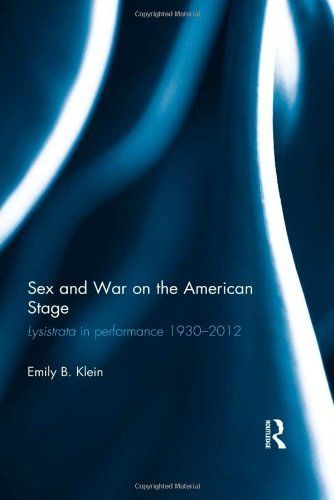
Sex and War on the American Stage Lysistrata in performance 1930-2012
American adaptations of Aristophanes’ enduring comedy Lysistrata have used laughter to critique sex, war, and feminism for nearly a century. Unlike almost any other play circulating in contemporary theatres, Lysistrata has outlived its classical origins in 411 BCE and continues to shock and delight audiences to this day. The play’s "make love not war" message and bawdy humor render it endlessly appealing to college campuses, activist groups, and community theatres – so much so that none of Aristophanes’ plays are performed in the West as frequently as Lysistrata. Starting with the play’s first mainstream production in the U.S. in 1930, Emily B. Klein explores the varied iterations of Lysistrata that have graced the American stage, page, and screen since the Great Depression. These include the Federal Theatre’s 1936 Negro Repertory production, the 1955 movie musical The Second Greatest Sex and Spiderwoman Theater’s openly political Lysistrata Numbah!, as well as Douglas Carter Beane’s Broadway musical, Lysistrata Jones, and the international Lysistrata Project protests, which updated the classic in the contemporary context of the Iraq War. Although Aristophanes’ oeuvre has been the subject of much classical scholarship, Lysistrata has received little attention from feminist theatre scholars or performance theorists. In response, this book maps current debates over Lysistrata’s dubious feminist underpinnings and uses performance theory, cultural studies, and gender studies to investigate how new adaptations reveal the socio-political climates of their origins. Emily B. Klein is Assistant Professor of English and Drama at Saint Mary's College of California. Her work has appeared in Women and Performance and Frontiers as well as Political and Protest Theater After 9/11: Patriotic Dissent (Routledge, 2012).